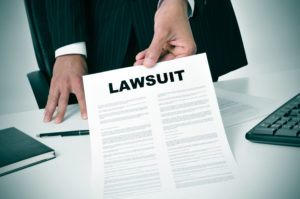It’s an ordinary Tuesday evening. You’ve stopped at the supermarket after work to pick up a few essentials, but after grabbing a package of chicken and a gallon of milk, you slip and fall in the frozen foods aisle. Ouch!
Can you sue for negligence in Milwaukee? Read on to find out if your injury merits a lawsuit.

First, A Definition
In legal terms, “negligence” simply refers to a failure to exercise reasonable care, leading to injury, harm, or other damages. Negligence can also be seen as any unintentional action that injures another person—as opposed to intentional torts such as fraud, assault, and battery.
Types of Negligence
Negligence is the most common form of tort claim, and as such, it encompasses a broad range of cases. The aforementioned slip-and-fall accident is one type. Others include car accidents, personal injury, wrongful death, and medical malpractice.
A Successful Negligence Lawsuit
If you bring a suit against a party you believe is negligent, and you either reach a settlement out of court or are awarded a judgment in court, you may be entitled to compensation. Plaintiffs can be compensated for lost wages or earning capacity, medical expenses, and/or pain and suffering.
The Four Steps of Proving Negligence
In order to win a judgment, the plaintiff and his or her attorneys must prove four elements. Let’s look at each element, using that grocery store slip-and-fall incident as an example:
- Duty of Care. Attorneys must prove that the defendant had a duty of care to the plaintiff. For example, the owner maintaining the safety of a supermarket or warning customers of potential hazards would be considered duty of care.
- Breach. If an employee at our fictional grocery store had spilled cooking oil, soapy mop water, or some other liquid on the floor and simply left the mess there without a warning sign, the store can be said to have breached its duty of care.
- Causation. The attorneys must prove that the shopper’s injuries—a broken leg, for example—were directly related to the breach of duty of care. In this case, it’s that slick of oil that caused him or her to fall.
- Damages. If you fall in a store but are not injured, you are not owed any damages. The injury must be severe enough to have caused pain, suffering, an inability to work (and therefore lost wages), medical bills, and so on.
Filing a Lawsuit
Negligence cases can be tricky. They require research, documentation, eyewitness accounts, expert opinion, and of course, a qualified and experienced legal team to prove liability.
While you could file suit for negligence in Milwaukee on your own, it likely won’t be successful. Not to mention the fact that if you have experienced an accident, injury, or illness, you need to focus on your own recovery.
Injured as a Result of Negligence in Milwaukee?
The best way to find out if you have a case? Schedule a complimentary consultation with Domnitz & Domnitz, whose compassionate attorneys specialize in cases of negligence in Milwaukee.
We can examine the specifics of your situation, advise you as to whether or not you have legal standing, and help you through the process of settlement or trial. That way you can receive the justice and compensation that you deserve. Contact our Milwaukee personal injury attorneys online or call 414-289-0909 today for a free consultation and review of your legal rights.



